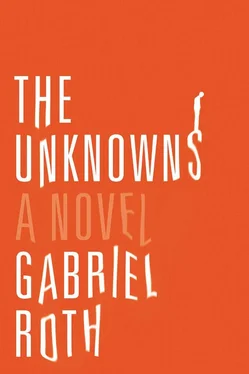Then a sudden flash of something terrible, something much worse than the fear. The feeling takes her over for a second, two, and then passes. This is what the fear has been pointing toward all this time. She lies on her bed. The feeling seems unconnected to anything in her mind. Except this: when her friends started talking about masturbation, she didn’t admit it, but she knew she would never, ever do that.
And she’s smart enough, she’s read enough books, and she knows: this is what happens to people who’ve been abused. It seems incongruous, a category she’s never imagined occupying, but she tries it on. Abuse: she turns the word over in her mind like a stone. Does this belong to me ?
Every night she wakes in a panic — sweaty, heart pounding, the sheet clenched in her fist. In the daytime she feels as if she has to relearn every social tactic. She develops an odd mannerism: a little pause after someone directs a question or a remark to her, in which she calculates the appropriate response.
She has never seen a therapist; she was brought up to feel a mild contempt for people who did. Her father went to a Freudian analyst in the 1960s and came away from the experience eight thousand dollars poorer and more deeply embedded than ever in his own personality. “It’s a trap,” he says whenever the subject comes up. “Why would they want you to get better? They have a vested interest in uncovering more and more problems, so you’ll keep coming back.” This is the opinion of therapy that Maya has filed away as her own, until Lauren, in her capacity as WPC for Maya’s floor, tells her about the psychotherapy and counseling services available free and in confidence from Student Health Services.
She fears that the therapist will work in an office decorated with sentimental kitsch — teddy bears, inspirational posters — and will try to hug her therapeutically. These concerns are put to rest the moment the therapist fetches her from the waiting room. A middle-aged woman with a severe black bob, a knee-length leather skirt, and high boots, she suggests a professional dominatrix more than a mother substitute. Maya has been steeling herself for their session since she made the appointment nine days ago. She hopes she’ll be strong enough to recall and confront her past in its horrifying glory, to replace her nebulous feelings with clarity — where she was, how old she was, what he did. Abreaction, catharsis: if she can remember, she won’t have to keep reliving the feelings. She has imagined the shrink urging her to force the memories into consciousness, like a physiotherapist exhorting a quadriplegic to push his atrophied muscles back into service.
It’s not like that. The therapist asks why she’s there, and Maya finds herself unable to answer. She sits in silence, staring at the shiny leather of the therapist’s boots for three or four minutes, before she can find a way to speak.
She gets it out by telling it as a story rather than a fact: We went out to dinner, and I came back and threw up, and this feeling came over me, and ever since I wake up in terror every night, and here’s what I think it means . The therapist doesn’t encourage her to remember anything, just asks about her relationship with her father. Maya tells her, and things seem sinister that until now had only seemed sad. The therapist makes notes on a yellow legal pad that she holds on her knee in landscape orientation, writing across the lines. The end of the session comes more quickly than Maya had expected, at which point the therapist suggests that they meet once a week.
Over the next semester Maya and the therapist become friends. The therapist likes Maya and thinks she’s clever: she laughs when Maya says something self-deprecating or amusingly honest, and she occasionally allows her own wit and warmth to break through her professional reserve. She doesn’t push Maya to talk about anything in particular. They spend one early session talking about Maya’s frustration with her history professor, a self-important fool, and as Maya walks out of the Health Services Annex toward the library she realizes that they didn’t mention her father at all. Two weeks later, after a difficult night in which panic woke her twice, she finds herself describing her experience more vividly than she has managed before.
“It goes beyond emotions,” she tells the therapist. “It’s a physical feeling — not like someone touching you, nothing concrete, but… it’s not in the senses, it’s in the body. It’s like — in high school they thought I had appendicitis and I had to get a CT scan. You know how before you get scanned they make you drink those chemicals to make your organs show up? And they say strawberry flavor or whatever, and you tell yourself it’s a milkshake, but as soon as you taste it you know it’s not a milkshake, it’s not even food, it’s something that does not belong in your body . You have to force yourself to drink it, not because it tastes bad, exactly, but because your body doesn’t want it, and you have to overcome your body’s deep, deep resistance to drinking it. God, I can taste it now, and it’s been three years. Anyway: that’s what this feeling is like, times a thousand. Like your body is stating as clearly as it possibly can that what’s happening is not right.”
The therapist has been sitting absolutely still, as though to avoid disturbing a grazing deer. She waits a few seconds more, to be sure Maya has finished talking, and then asks, “Are there any thoughts that accompany the feeling?”
“When it first happened, there weren’t any thoughts,” Maya says. “Except maybe No, no, no .” She and the therapist smile sadly at one another. “But now I usually think about my dad. Nothing specific, just thinking about him. I don’t know if he’s in my mind or if I’m, like, trying to think of him.” The therapist nods.
At the following session, Maya tells the therapist about her sexual history, which now spans three years and seems to her a complex narrative with developments and reversals and surprises. She’s clever and tough, and boys have always liked her. The boys she likes are the ones who don’t have a clear place in the social hierarchy, not at the top and not in the middle striving for the top, but off to one side. She tends to break their hearts. She feels sorry for them when this happens, but there’s something she likes about the naked emotion, the pleading and seriousness. It feels sad in a way she might call realistic . And she enjoys the power, the boy swept up in his passion for her while she vacillates and searches her feelings and remains unmoved. She also enjoys sex. From the beginning, or what seemed to her the beginning — sixteen years old, Jeff Keyhoe, in his room — she was adept at it, confident, confrontational. One thing bothers her: intermittently she’ll find that she’s not really present; the sex is going on and she’s missing it. Once, with Jake Sohnfeld, an orgasm returned her to herself and she realized she had no memory of turning over onto her back.
The therapist refers to this as dissociation . “How often does this dissociation happen?” Not often, but more than Maya would like. “Is it frightening?” Not frightening so much as saddening, like she’s being deprived of something. “Does it seem to you as though it’s connected to the abuse?” It’s the first time she has referred to the abuse , and it feels right, like snapping together the tongue and buckle of a seatbelt.
Maya arranges to stay with Emily’s family in Boston over Christmas break. She presents it to her father as a fait accompli. He objects mildly.
In their second session after the vacation, the therapist gently asks Maya if any memories of the abuse are coming into focus. Maya is silent, examining the knotted strings at the edge of the rug on the floor of the therapist’s office. Then she says that, yes, certain images and ideas have lately come into her mind, along with sensations more specifically located in her body. The therapist carefully asks her if she feels she can describe any of these memories, and Maya does so: the feeling of her father’s large hand between her legs, and of his smooth chest pressed against her face. After this session she goes to the library to research a paper on Max Weber and bureaucracy, then returns to her dorm and cries.
Читать дальше












